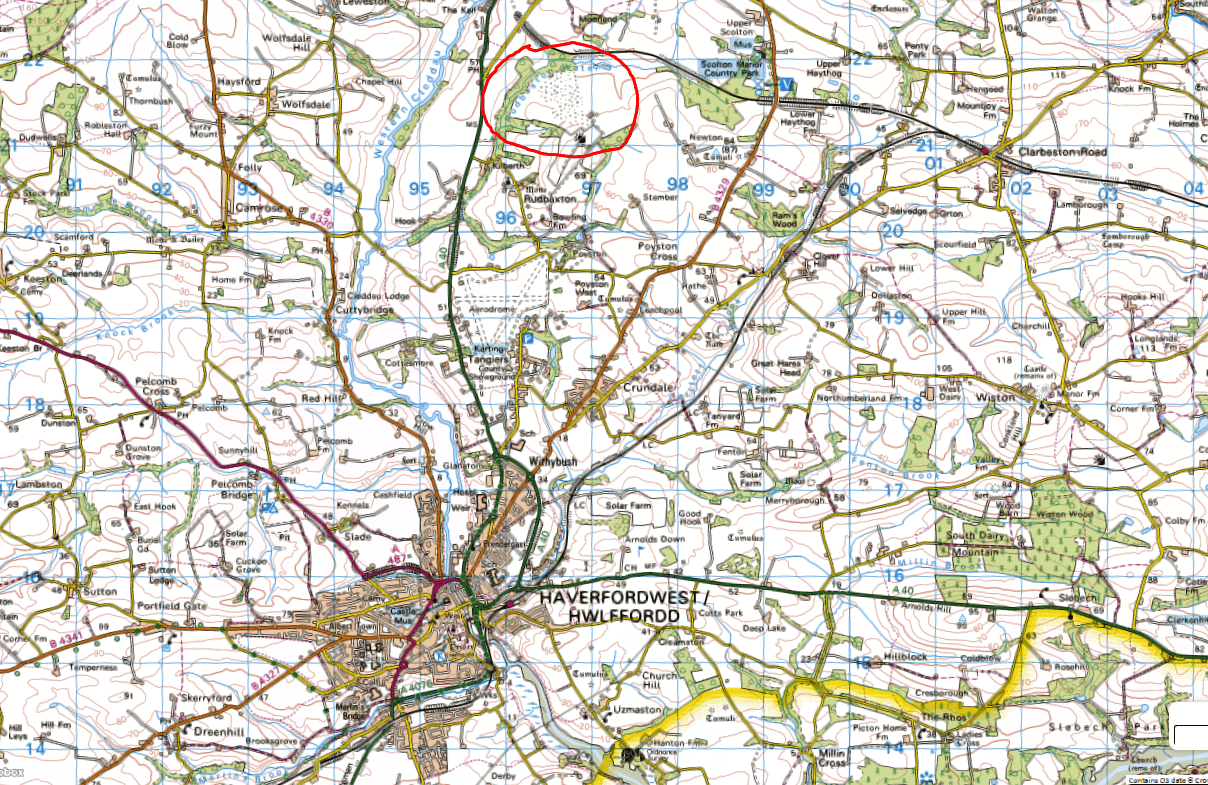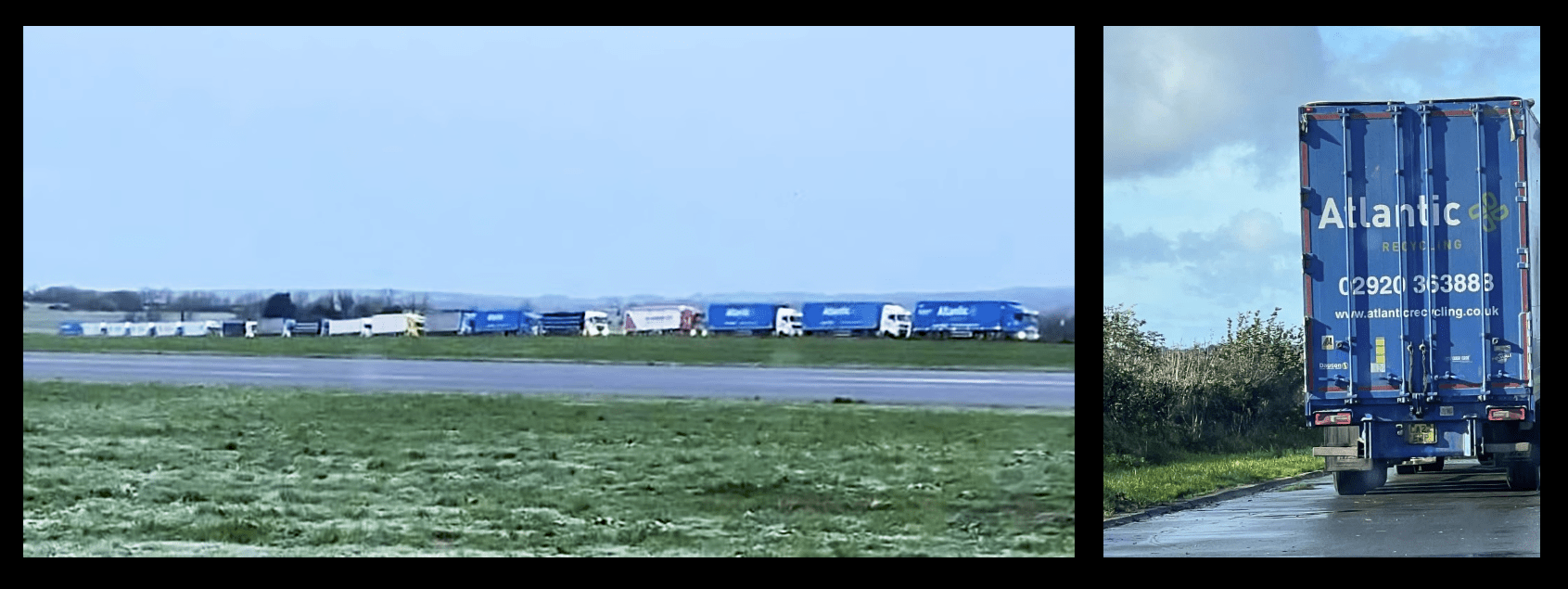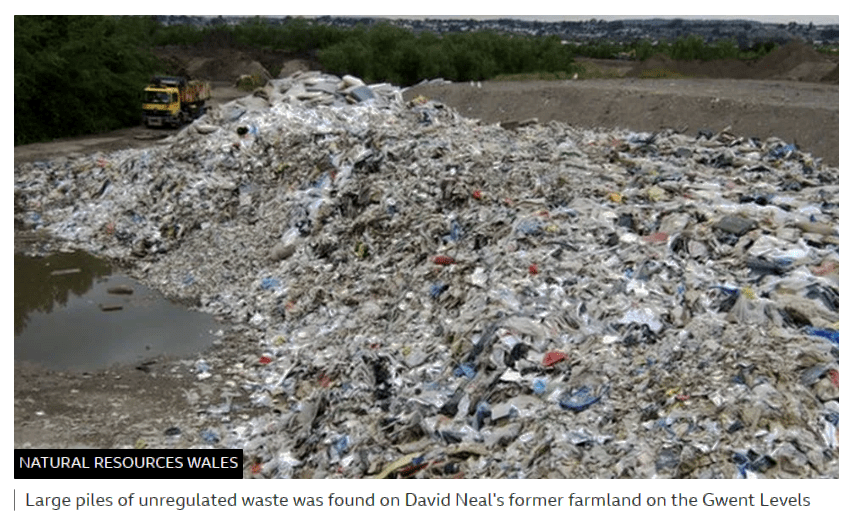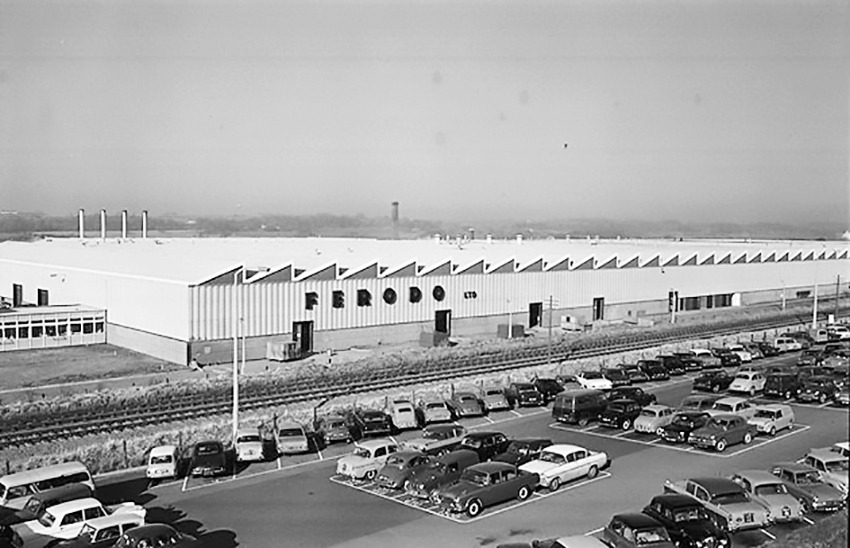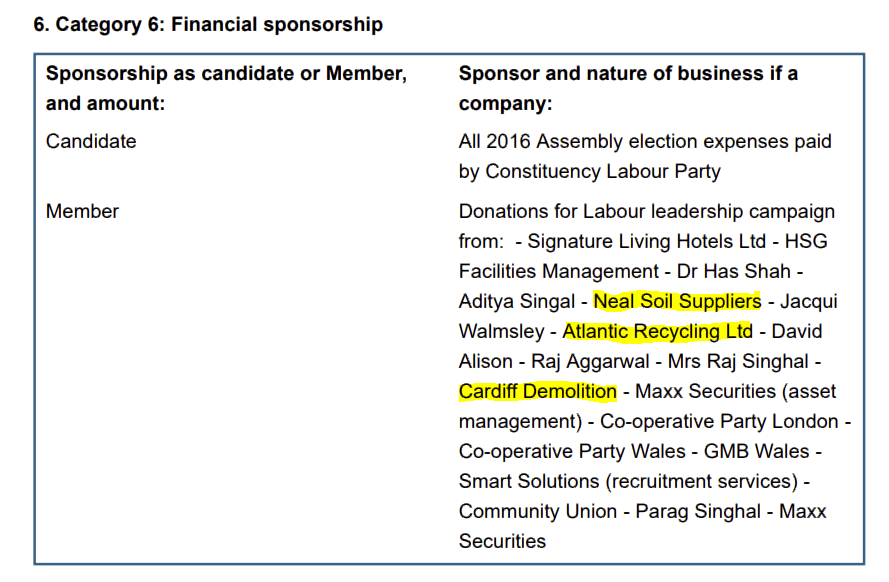![]() This piece is about corruption and mutual back-scratching in and around the Labour party. ‘So what’s new?’, you ask. Well, this piece introduces some new faces, and connections that may surprise you.
This piece is about corruption and mutual back-scratching in and around the Labour party. ‘So what’s new?’, you ask. Well, this piece introduces some new faces, and connections that may surprise you.
And with an election on July 4, I will take any and every opportunity to put the boot into Labour and its fellow-travellers.
My original intention was to write about the eco-shriekers at Wales Environmental Link (WEL). In particular, Natalie Buttriss, formerly of the attempted land grab Summit to Sea; and Rachel Sharp who, in November 2021, lied to Senedd Members about Welsh farmers using growth hormones.
Sharp’s been joined at the (officially non-existent) Wildlife Trusts Wales by Extinction Rebellion’s Tim Birch, a real extremist who was chased out of Derbyshire.
Then I saw that WEL is now based at ‘Tramsheds Tech Ltd, Unit D, Tramshed, Pendyris Street, Cardiff CF11 6BH’. So I made a quick delve (as you do) and decided there was a bigger and fresher story at the Tramsheds.
Fresher, because I haven’t written about it before.
And that explains what you’re about to read.
◊
THE TRAMSHED
I’d seen the name a few times, but it meant little to me. As far as I could tell it was one of those outfits that rents out office space by the day or the week. Here’s a link to the Tramshed website, which might help.
Vaughan Gething launched his leadership campaign from Tramsheds’ Newport base. And why not? For as the Pembrokeshire Herald reminded us, it had received ‘Welsh Government’ funding through the Soft Landing programme. And then returned the favour with a £3,000 non-cash donation to Gething’s campaign.
Here’s the Companies House entry, and at the time of writing compulsory strike-off action was in progress because the accounts were almost two months overdue.
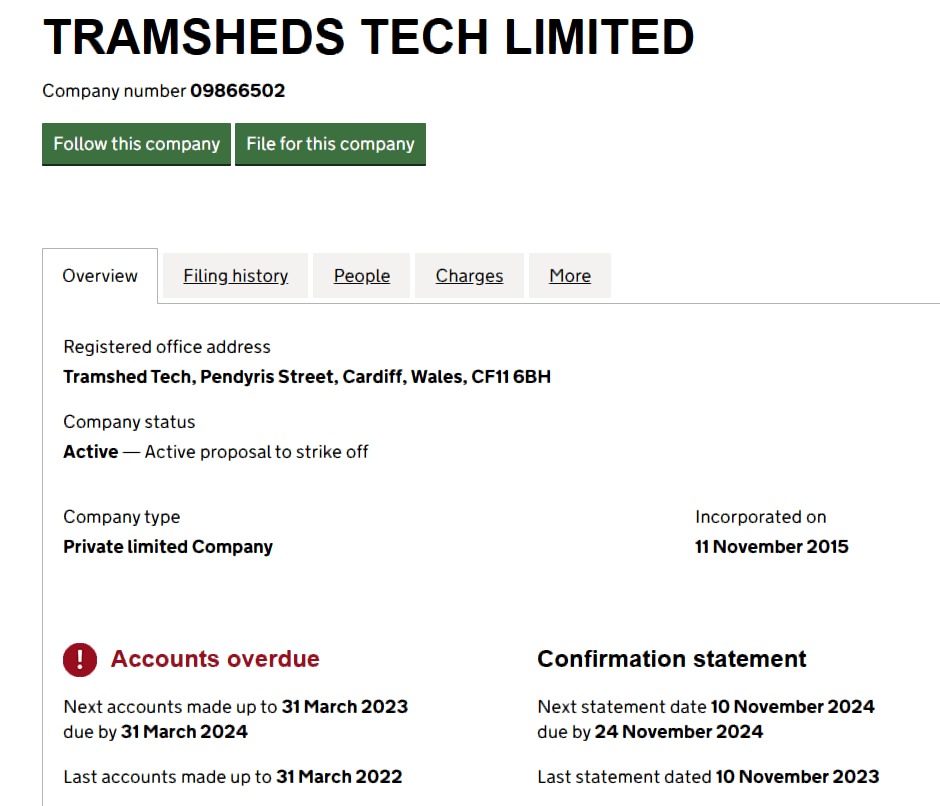
One of the two charges against Tramsheds Tech is a loan from Finance Wales Investments (since re-named the Development Bank of Wales) in July 2017.
The Tramsheds Tech directors are Louise Margaret Harris, CEO and co-founder, Labour peer Lord Evan Mervyn Davies aka Lord Abersoch, Simon John Dixon, and Thomas Gwyn Davies (who I take to be Abersoch’s son).
Staying with the People tab, we see that control over Tramsheds is exercised by Tramsheds Holdings Ltd.
Here’s the Companies House entry for Tramsheds (Holdings) Ltd. You’ll see the same directors as for Tramsheds Tech.
Harris is also a director of a company based at Tramsheds, Partneriaid Oleia Cyf, along with media types Huw Eurig Davies and Kevin Tame. Until January this year, control of the company was exercised by Tramsheds Tech, before passing to Davies and Tame.
Let’s go back to Tramsheds (Holdings) Ltd, the parent company of Tramsheds Tech.
When it began life, in March 2021, all 300 shares were held by Lord Davies. The situation as reported March 27 was what you see below. Though Huw Eurig Davies ceased being a director 28 February, and Mark Prosser John was never a director.
To save you reaching for the abacus . . . the other four combined hold one share more than the noble lord.
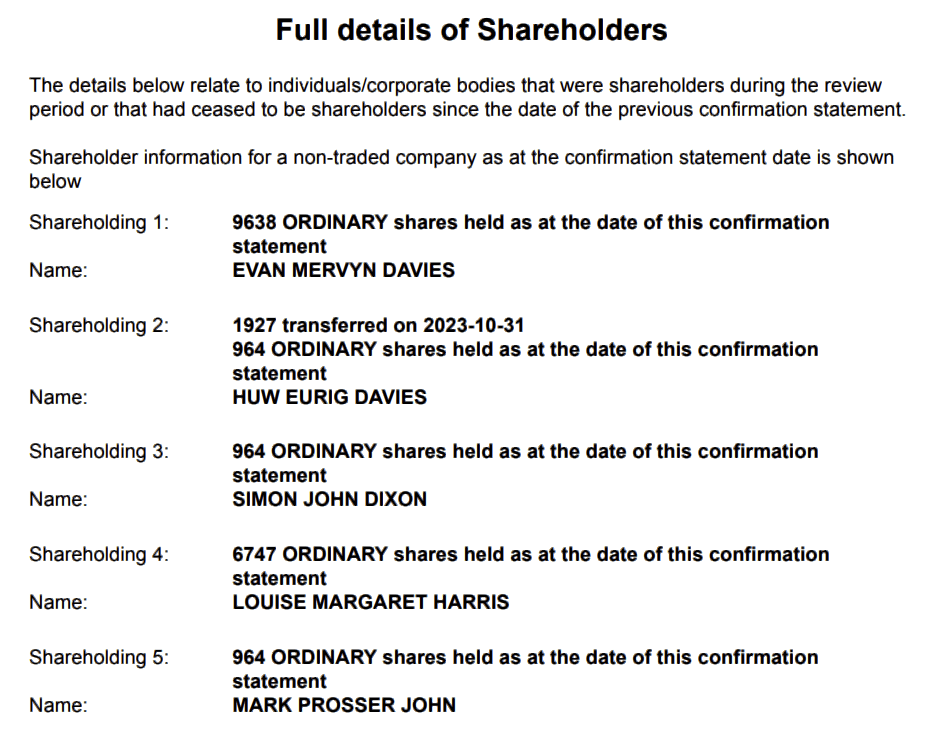
I can’t tell you a lot about Mark John, but he was a director at Tramsheds Tech Ltd until 29 November 2023. In fact, he was the co-founder with Louise Margaret Harris.
John appears to be another media type.
The only company he’s involved with now is BLC (Wales) Ltd, based at Tramsheds Tech, where the other director (and secretary) is Louise Margaret Harris; accounts are overdue with Companies House, and the most recently filed accounts do not paint a rosy picture.
So, we have directors of what appear to be linked companies, all based in and connected with the old Tramshed on Pendyris Street.
◊
‘THE SCOURGE OF LEASEHOLD’ (AS LABOUR REGULARLY SAYS)
Inevitably (cos I’m a nosy bugger), I got to wondering who owns the Tramsheds building. And so I popped over to the Land Registry website for the title document and plan for the site. You’ll see that it’s owned by Cardiff council.
Or to be absolutely clear, Cardiff council owns the freehold, but an agreement was entered into, in December 2014, to lease the building to DS Properties (Pontypridd) Ltd for 999 years.
But after the appointment of an Administrator in February 2018, this company was finally dissolved in June last year. At the end, ownership lay with DS Holdings (Penarth) Ltd. So that’s our next stop.
DS Holdings (Penarth) Ltd is owned by Simon Malcolm Baston, the sole director. He has a number of companies that specialise in renovating and converting old buildings, most of which have been taken over by the local council, which is always Labour controlled.
An example would be the old Albert Hall cinema in Swansea. (I remember the uniformed doorman!) Baston got the money for that project from The Welsh Ministers. And Baston’s no stranger to Swansea. He’s been getting contracts in my home town for at least 20 years.
And just up town, Tramshed Tech is involved in the renovation of the Palace Theatre. Though I suggest that the picture below is misleading.

Gwenno Jones donned a hi viz jacket and a hard hat for a photo op, otherwise she’s togged up for a night out.
Tramshed Tech will be running the revamped Palace when it’s completed by Simon Baston and DS Holdings (Penarth) Ltd, or whoever’s actually doing the work.
There may even be local firms getting a look in!
To recap: the Tramshed building is owned by Cardiff council. It was leased late in 2014 / early 2015 to DS Properties (Pontypridd) Ltd, which was owned by another Simon Baston company DS Holdings (Penarth) Ltd.
Baston duly renovated the Tramshed, and converted much of the building into flats. These flats – 31 by my count – were then sold on 250-year leases in 2016.
Though the music venue at the Tramsheds was leased for just 15 years to Alchemy Tramshed Ltd, which used a Cardiff address. This company was taken over in November and December 2019 by Australian company TEG Venues UK Ltd.
The Tramshed Café and the Dance Studio were also leased for 15 years.
Then, in May 2021, the site, or part of it, seems to have been sub-leased for £2,850,000, to Tramsheds Cardiff Ltd. Scroll down on the title doc for the title numbers of the individual leases. And, at the bottom, the plan of the site.
Here’s the other title involved in the same deal. For a very narrow strip of land, probably a pathway.
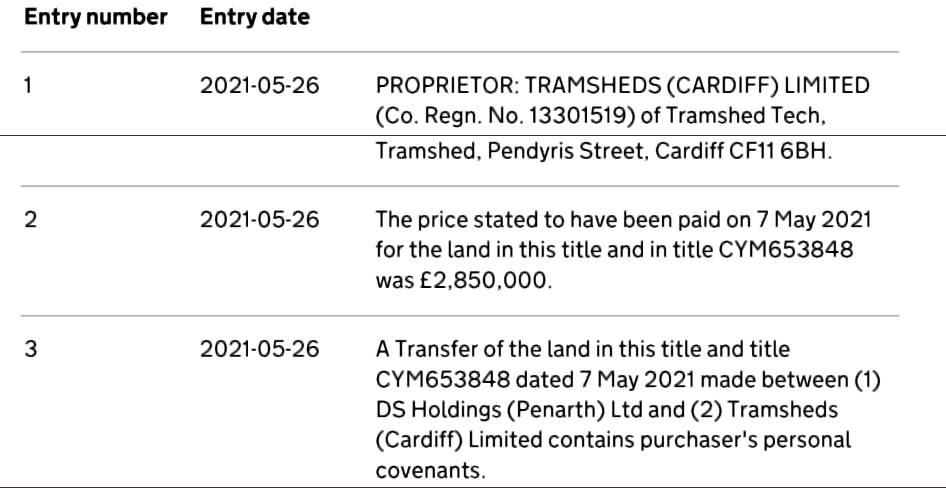
Tramsheds Cardiff Ltd is another company of Labour peer, Lord Davies. and owned by Tramsheds (Holdings) Ltd, which we looked at earlier. The purchase of the Tramshed leases was financed with a loan from the Principality Building Society.
We seem to have come full circle. But what have we learnt? Let’s go through it.
◊
FOLLOW THE MONEY
Wherever we look in this story, which takes us across south Wales, we find ourselves dealing with former commercial or industrial properties owned by Labour-run councils.
I’ve focused on the assorted ‘DS’ entities and linked outfits, but there may be other companies in the same business, with other buildings. But I just don’t have the time or the resources to check.
What I also found to be interesting was that the outstanding loans against DS Holdings (Penarth) Ltd are with: Swansea council (Labour), Cardiff council (Labour), Welsh Ministers, Principality Building Society, and the ‘Welsh Government’-controlled Development Bank of Wales.
Another lender was the Julian Hodge Bank in Cardiff. For younger readers . . .
Hodge was a big man in Cardiff, very pally with Jim Callaghan Labour MP, and PM, and George Thomas, another of the City’s Labour MPs, who went on to become Lord Tonypandy. They had hopes of Hodge’s Commercial Bank of Wales becoming a recognised bank like Lloyds or Barclays, but the regulators knocked it back.

The whole episode is explained in this February 2016 issue of Rebecca, that reprints an article from the spring of 1977.
Even so, The Hodge Bank still operates, and remains very close to the Labour party.
Some of the other DS companies, ones I haven’t mentioned, such as DS Properties (Goods Shed) Ltd, have enjoyed loans from the Monmouthshire Building Society.
Now I’m not saying that this building society is tied to the Labour party. But I will point out that when the ‘Welsh Government’ was toying with the idea of Banc Cambria, it was the Monmouthshire Building Society involved.
What’s beyond doubt is that behind all the DS companies is Simon Baston, and so it’s reasonable to assume that – like Vaughan Gething’s benefactor, David Neal – Baston looks favourably upon and is in turn favoured by Labour.
And as I said earlier, on January 16 Gething launched his leadership campaign in Tramshed Tech’s Newport operation. I quote the South Wales Argus: ‘He kicked off his speech by thanking Tramshed Tech for hosting him in “this fantastic space they’ve created in the heart of Newport“.
And to complete the image of comradely solidarity, the Count of Abbasock has returned to the land of his fathers. After apparently turning his back on Wales at an early age, for none of his other companies has any connection with his homeland.
So why has the Tramshed drawn him back? And will his reawakened interest end with the Tramshed, or will it expand?
We’ve seen the charges against Tramshed Tech but I’m certain there’s other money coming in that might not even be shown in the accounts. (When they’re filed.) For example, I unearthed this article on UKTN about money coming from the British Business Bank.
I also found the section below in this Cardiff council document. Another £250,000.

How many more hand-outs have there been from local authorities, the ‘Welsh Government’ and other sources that we don’t know about?
To help you take it all in here’s a small table of the main events in a timeline.
UPDATE: How did I miss this! I am indebted to Born Guessing @drakefraud for this reminder from WalesOnline that Lord Davies’s wife dropped £21,600 into Vaughan Gething’s campaign war chest.
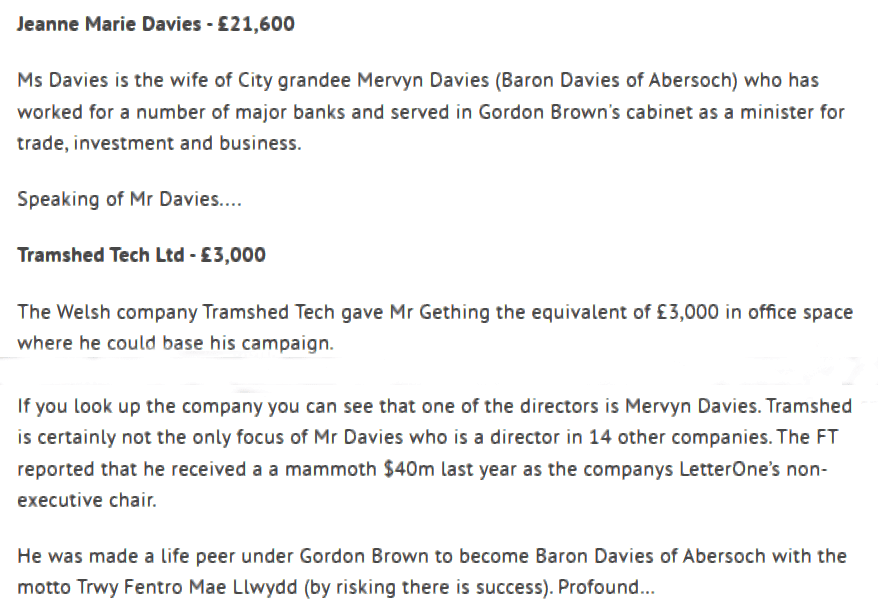
What an odd amount. What currency was the donation made in, euros, dollars, or even roubles? Do the rules say owt about donations from beyond this Scepter’d Isle?
◊
FINAL THOUGHTS
As I’ve suggested, The Tramshed gets a lot of positive coverage in our uncritical media; bright young things being innovative and ground-breaking, etc., etc.
And yet, maybe that’s just froth, for the real business and the real money may be in the leases for the 31 flats, and the café, and of course the 1,ooo capacity music venue.
Welcome to socialist Wales 2024. The circular economy, benefitting those lucky enough to be in the ‘circle’. Where there’s no private investment, and everything is state funded, but only those close to the ruling party can benefit. So that Tramsheds can play ‘diversity’ games, and provide a base for outfits like Wales Environmental Link, favoured by the regime because it works to destroy Welsh farming.
And as we’ve seen in this Tramshed saga, Labour, the party that has promised so often to do away with leasehold, will actually encourage and extend the use of leasehold – when Labour insiders benefit.
Devolution has been a disaster. And it couldn’t be much better under a different party. To stamp your little feet and yell that Wales should be a full-blown Marxist state suggests to the adults in the room that it might be past your bed-time.
And yet, in the election on July 4, Labour will win more Welsh seats than any other party. A painful reminder that I belong to a nation with too many fuckwits.
♦ end ♦
© Royston Jones 2024

